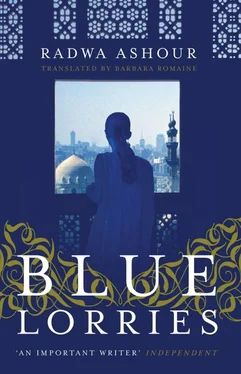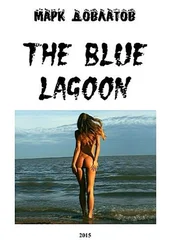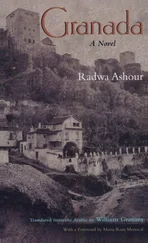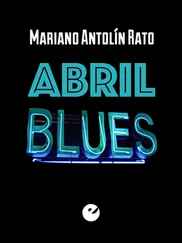I seized upon the word I knew. ‘It’s not true — they weren’t adventurers!’
‘Oh, yes they were.’
‘That’s what the French Communist Party said, and it was a poor position. The young people in the movement in France are contemptuous of it, and don’t have confidence in the trade-union leadership that subscribes to it. And here I don’t think anyone even knows anything about the Communists — or cares about them!’
Thrust and parry.
The round was over. I calmed down. Or it seemed to me that I was calmer. As soon as I was by myself, I confronted the question: What was I to do if my father married that woman?
Move to Paris and live with my mother?
Move to Upper Egypt and live with my aunt?
What about school?
There was no French school in the village.
I could switch to an Arabic school.
I could stay in Cairo, enrol in a boarding school, and never have to see that woman’s face, slathered with makeup.
The following morning, instead of ‘Good morning’, I announced, ‘I won’t stay in this house if that bit-player comes to live with us here.’
He shouted at me, ‘You spoiled brat, you think of nothing but yourself! On top of it you’re insolent, you don’t know when to give it a rest — no manners, no respect for your elders! I will marry Hamdiya!’ (Oh, my God, and her name’s Hamdiya! I’d forgotten she had a name. Where did her family come up with a name like that?) He said, ‘I’ll marry her and you’ll live with her and you’ll treat her with all possible respect. I absolutely will not put up with any of your cheek.’
I shouted at him, ‘My mother waits five years for you, while you’re in prison, and when you get out you leave her and marry a monkey named Hamdiya!’
He slapped me.
I didn’t go to school. I spent the whole day crying. If my mother had been with me she would have known that this crying jag was the longest (longer than the bout of tears over the baby’s spitting up on the new red dress I had wanted to dazzle my father with the first time we visited him in prison).
That evening he tried to make up with me, but I refused. For two weeks I didn’t say a word to him.
This was the beginning of the most difficult phase of my life. A woman I couldn’t stand came to our home to live with us, leaving me nothing of my familiar abode except my bedroom, the only place in the house that was off-limits to her. Her presence in the house made me feel stifled, as if she were not merely treading upon one of my limbs, but actually standing on my chest with all her considerable weight. I wished she would die. Every day, every hour, every moment I wished she would die. The resentment I felt for my father was limitless. He didn’t care, paid no attention. He saw nothing, heard nothing, felt nothing. Meanwhile, I crouched with my head in my arms, in a futile attempt to protect it from the debris from the house, some of whose rubble was still coming down on me, wood, glass, and stone, wounding me and causing me to bleed.
It seemed to me that I hated him. It seemed to me that I pitied him, my pity mixed with contempt. I felt my father was stupid — foolish and selfish, that his selfishness was tragic.
I began writing long letters to my mother, and counting the days until hers arrived. I distanced myself from my friends, since it seemed to me that intimacy was not possible unless I talked about my troubles, and I couldn’t bring myself to talk about my father in the unfavourable terms in which I had come to view him.
Chapter eight
Ticket to France
When I started attending secondary school, I read a great deal, but after the bit-player came to live with us I began to read ravenously, ceaselessly. I read novels, books on history, sociology, and politics. (My mother sent me a book on the revolution of ’68, which I started reading the moment I received it on my arrival home from school, and I finished it half an hour before school began the next morning; I fell asleep twice in class that day.) I read everything I could get my hands on. Novels were my genre of choice — the use of language enchanted me, its magical power to transport me from here to there, into other times and places, into the lives and destinies of different characters. I laughed and cried, my heartbeat would quicken or seem about to stop altogether, from fear or anticipation of some exciting turn of the plot. I was living a parallel life that absorbed me entirely, far away from Hamdiya and her husband, a life whose settings and casts of characters changed with each new literary work. I would finish one novel and start another, and, as soon as I was done with that one, take up a third. I polished off all the novels in the house that my mother had left behind, or that my father had acquired. Nineteenth-century French novels, whether romantic or realist: works by Hugo, Chateaubriand, Balzac, Stendhal, Flaubert and Zola; Arabic novels by Tawfik al-Hakim, Naguib Mahfouz, and Abdel Rahman al-Sharqawi; Algerian novels written in French by Kateb Yacine and Mohammed Dib; and English novels translated into French or Arabic, by Dickens and the Brontë sisters, Charlotte and Emily. Television was of no interest to me, nor did I play any sports, other than in physical education classes and the required activities in which we had to participate two days a week at the end of the school day.
By the time I was sixteen, my accumulated knowledge was a startling mixture, in which Balzac’s peasants mingled with Al-Sharqawi’s; the back streets of Cairo crisscrossed with the alleyways of London; to get from Madame Bovary to Amina, the wife of Ahmed al-Sayyed Abdel Gawwad in Mahfouz’s trilogy, required no more than a slight turn of the head; and lovesick Heathcliff and Rochester’s mad wife, whom he imprisoned in his attic, seemed more real and present to me than the actual human beings with whom I interacted every day. Moreover, all this reading gave me power over my peers. I knew more than they did, so I spoke with ease and confidence — who, after all, at the age of sixteen, could have lived through a protracted, tempestuous love such as Heathcliff’s, in which love combined with hatred and evil? To whom was granted the singular experience of transforming in the blink of an eye from the denizen of a thieves’ lair in a gloomy city to a splendid young man taking part in a rally in joyful celebration of Saad Zaghloul’s return, only to be shot by one of the occupying soldiers? And who, in dreams at night, merged the image of this youth with that of another, his hair unkempt, talking of how he participated in the takeover of the Sorbonne?
In the third year of secondary school my teacher said to me, ‘Nada, you have a distinctive style — a subtle, literary style. Will you enrol in the College of Humanities?’
‘No,’ I replied, ‘I intend to join the College of Engineering.’
In the autumn of 1971 I enrolled at the College of Engineering, and by the end of that school year I had failed. It wasn’t because I had discovered that the curriculum was dull and I didn’t like it or want to continue specialising in it, although in fact I did make this discovery. And it wasn’t because of the stress of Hamdiya’s being with us at home, for I ignored her completely. I had been preoccupied with student activism. It wasn’t merely a matter of participation, but of active involvement in innumerable details and new ideas, and unexpected new horizons that had opened up before me. A new feverishness swept me up entirely, and entwined with it was an attachment to one of my comrades — an attachment that was rather like the roller coaster at an amusement park, carrying me up to dizzying heights and dropping down all at once, only to scale the heights once again.
At the university I buzzed around like a honeybee. I flew from the Engineering School to the Humanities, from Humanities to Economics, then dashed back to Engineering, and finally to the main campus. I attended conferences and council meetings and discussion groups, acceding and dissenting, agreeing and disagreeing, and saying, ‘Point of order.’ Surprisingly quickly, I became conversant with history and politics, and acquired a lexicon of terms that, a year earlier, I would have thought arcane and inaccessible. At home I copied out communiqués on the typewriter and edited a wall newspaper in which I transcribed articles given to me by my comrades, and then filled any remaining spaces with satirical cartoons, decorations, and lines of poetry both colloquial and formal.
Читать дальше











